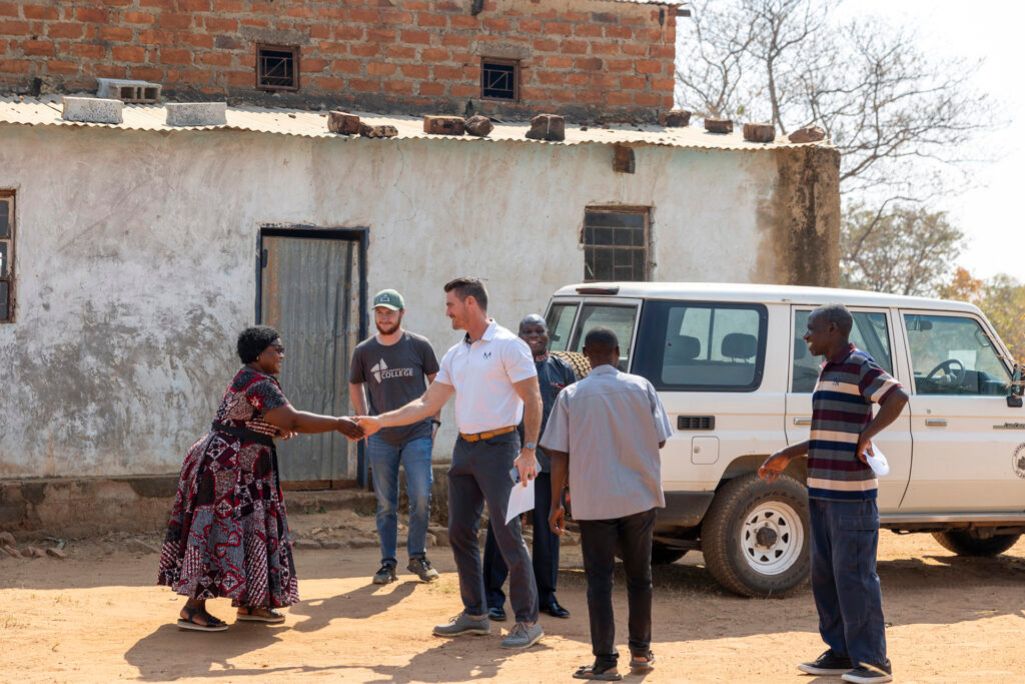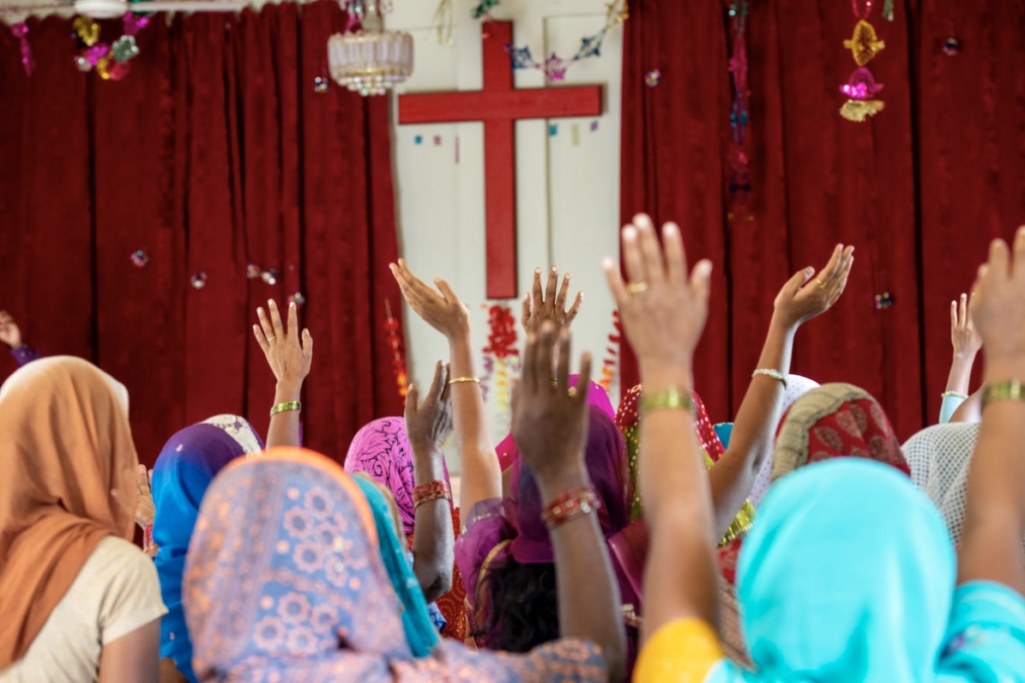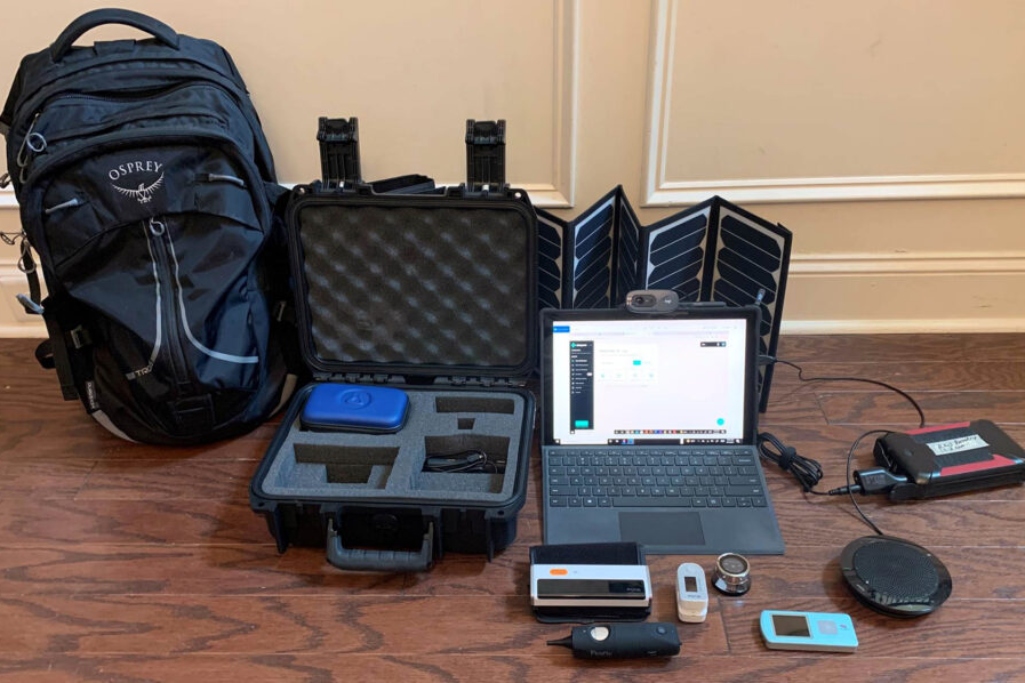
James Adair, IMB missionary, greets leaders in a village with Presley Adams, summer Nehemiah missionary.
University students from Zambia, Mississippi and Tennessee sat around a blazing fire pit in Lusaka, Zambia. Songs and laughter filled the night air. And as often happens with college students, conversations moved deeper the longer they hung out.
“What should I do with my life?” “I’m lonely and depressed. Does anyone even care?” “What does God have to do with me?”
Relating like this shocked Canaan Chitwood, a sophomore at Roman State Community College in Oak Ridge, Tenn. (no relation to International Mission Board [IMB] President Paul Chitwood). Being vulnerable wasn’t something she and her lifelong friends back in Tennessee did so openly. But after six weeks in Zambia, her Nehemiah missions team learned one of the greatest assets in ministering among university students, especially peer to peer, is to be authentic.
“We’re all going through the same things whether we talk about it or not. This summer, I realized it’s OK to talk about problems and struggles. We don’t need to be a highlight reel,” Chitwood said, referring to the social media practice of showing only the good and positives of life. “It’s OK to show vulnerability because it also shows the strength of the Lord.”
The Lusaka Nehemiah team — made up of Chitwood; Bailey Miles, Knoxville, Tenn.; Mattie Phelps, Mississippi State University in Starkville, Miss., and Presley Adams, Delta State University in Cleveland, Miss. — spent the summer sharing the gospel and discipling believers on college campuses. Zambia has more than 70 universities and colleges with students from all over the world. And just like their American counterparts, it’s a time in life when university students explore their own beliefs and are most open to the gospel.
The summer missions team worked alongside IMB missionaries and partnered with local churches and believers like Peter Phiri and Joseph Kabwe. The pair of university students introduced the Americans on different campuses and helped them feel comfortable in the Zambian culture.
Phelps said one interesting cultural aspect was people saying they were Christian simply because Zambia considers itself a Christian nation. While that thought process was somewhat like her campus in Mississippi, there was a huge difference between the two cultures: Zambian students readily stopped to talk about religion and Jesus.
“When you get into these conversations, they realize what they think is not actually what the Bible says,” Phelps explained. According to the government census, 85% of the population claim to be Christian. Evangelicals make up less than 25% of that statistic. “We try to get to the bottom of who they think Jesus is.”
As they built relationships and repeatedly talked to students, the conversations became deeper. The team joined or hosted small groups for Bible study and discipleship to help answer the hard questions using the Bible. These times of fellowship were Miles’ favorite. Her faith and relationship with Jesus grew because of studying the Bible alongside Zambian students.
She admitted to being shy about talking to strangers on the college campuses. By the end of the summer, though, she realized this type of evangelism was the precursor to discipleship and deep connections.
“It’s hard to talk to people your own age and be authentic,” Miles said. She spent the summer learning how to engage in gospel conversations and keep the connection going.
“When I go home,” she told the group of students gathered around the fire pit to say goodbye on the Americans’ last night, “I can keep this boldness in Jesus. I’m more equipped now to go and share the gospel or just talk about my faith.”
Many in this group met the Nehemiah team through their evangelism efforts, Bible study or the outdoor student rally called “Ignite.” They are majoring in medicine, engineering, education, business and other subjects. They represented many of the 72 tribes in Zambia, each with a different language.
Adams pointed out that despite everyone’s differences or similarities, only one thing drew them all together around the fire — Jesus.
“It’s been a summer of getting to know who Jesus is and the sacrifice He made,” Adams said. He then pointed to the singing, dancing and praising of Jesus and smiled. “This is just a small scale of what Revelation 7:9 will look like with every tribe and nation praising Him. I’m so glad I got to be a part of it.”
(EDITOR’S NOTE — Sue Sprenkle writes for the IMB. Learn how you can spend 6-8 weeks serving alongside IMB missionaries next summer here. )


